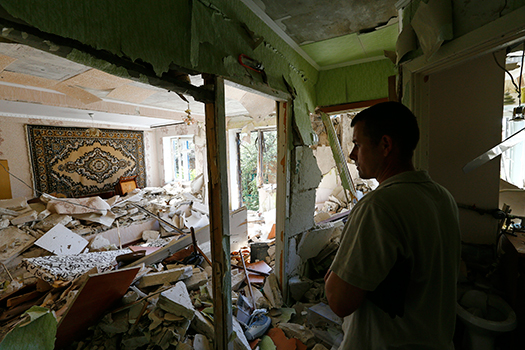 As Ukrainian President Petro Poroshenko announced an end to the cease-fire by government forces fighting Russian-backed militants in the Donbas region of the southeast, new accounts emerged to show how futile was the ten-day truce. Ukraine’s Foreign Ministry reported that the country’s armed forces lost 27 soldiers killed and 69 wounded.
As Ukrainian President Petro Poroshenko announced an end to the cease-fire by government forces fighting Russian-backed militants in the Donbas region of the southeast, new accounts emerged to show how futile was the ten-day truce. Ukraine’s Foreign Ministry reported that the country’s armed forces lost 27 soldiers killed and 69 wounded.
And from Donetsk, the effective capital of Donbas, Yevhen Shybalov writes of the truce that only pessimists got this one right. Shybalov is a correspondent for Ukraine’s most prominent weekly paper, Dzerkalo Tyzhnia (the paper is published in Ukrainian and Russian as Dzerkalo Nedeli – the names translate as the “Weekly Mirror”), and his dispatches have often given a feel for the grimness of life in Donetsk at war.
Shybalov recounts attacks by the Russian-backed militants that made a mockery of Poroshenko’s truce offer. The rebels shot down a Ukrainian military helicopter, killing nine soldiers. They twice tried to storm airports, in Donetsk and Kramatorsk. They attacked a tank base in the town of Artemivsk, destroyed bridges and rail lines, attacked government forces’ checkpoints and seized new hostages, including an aide to Donetsk governer Serhiy Taruta.
“If this is a cease-fire, then what will the war be like?” asks Shybalov.
On June 23 the leaders of the self-proclaimed “people’s republics” in Donetsk and Luhansk provinces met with former Ukrainian President Leonid Kuchma, Russian ambassador Mykhail Zubarov, and Heidi Taliavini, a mediator with the Organization for Security and Cooperation in Europe. Two pro-Russian politicians including a business “oligarch” with ties to Putin, Viktor Medvedchuk, also joined the meeting, although, Shybalov writes, no one could quite figure out whom he was representing.
Everyone in the June 23 meeting agreed to a cease-fire – but the violence continued. In just the last 24 hours of the attempted truce, four people were killed and 17 wounded in the fighting in the east, writes Shybalov.
Donetsk and Luhansk authorities also reached out to the militants behind the scenes, Shybalov says, trying to negotiate.
But even the best negotiator couldn’t calm this fight, points out Shybalov. The fighters on the separatist side are disparate — Russian imperialists; hired fighters from South Ossetia, Serbia, Transnistria and Chechnya; low-level criminals and local separatists. They have no central governing authority.
In only Donetsk province, five distinct fighting groups operate independently, sometimes fighting among themselves in what Shybalov says resembles the criminal wars and public shootouts that convulsed the Donbas region in the 1990s. These contending forces are the so-called Vostok (East) battalion, comprising largely Chechens; the Oplot martial arts club contingent; the so-called Russian Orthodox Army; the rebel forces at the northern city of Slaviansk, led by Russian army Colonel Igor Girkin; and another rebel group based at Horlivka, a town about 25 miles northeast of Donetsk, led by the alleged Russian army officer Igor Bezler.
The most thoughtful participants in this dirty little war are thinking about how they can eventually extricate themselves from it, keep the money they’ve made, and avoid being charged with terrorism, a charge that carries a hefty sentence, writes Shybalov.
The Russian-Ukrainian border, which cuts through through farmlands and woods south of Donetsk, is a one-way passage, Shybalov writes. Fighters, weapons, trucks, tanks and more move freely into Ukraine, he says – but they have no way back. He writes that members of the Vostok battalion, trying to cross from Ukraine back into Russia, have been disarmed and arrested.
While Shybalov’s account of the one-way border, and similar stories in other Ukrainian media, appear not to have been independently confirmed, Russia is keeping a low profile on the return of Russian fighters killed in the war, as a recent story of the repatriation of Russians’ bodies illustrated.
On the Ukrainian government side, troops often complain that they are held back by their commanders. Social media, newspapers and web sites are awash with criticism of the military leadership by Ukrainian soldiers, volunteer paramilitary fighters, journalists and analysts. No sooner do Ukrainian soldiers score a victory, writes Shybalov, than they are pulled back and not allowed to pursue their enemy. Pulled back so they can be shot at, again and again.
That may begin to change. President Poroshenko declared the end of his truce yesterday after a lengthy meeting with his Security Council that followed a telephone conference with the French, German and Russian leaders. “We will attack and free our lands,” Poroshenko announced. “The decision not to continue the cease-fire is our answer to terrorists, militants and marauders.”
Image: A local resident stands inside an apartment inside a block of flats damaged by a recent shelling in the eastern Ukrainian town of Kramatorsk July 1, 2014. REUTERS/Shamil Zhumatov
